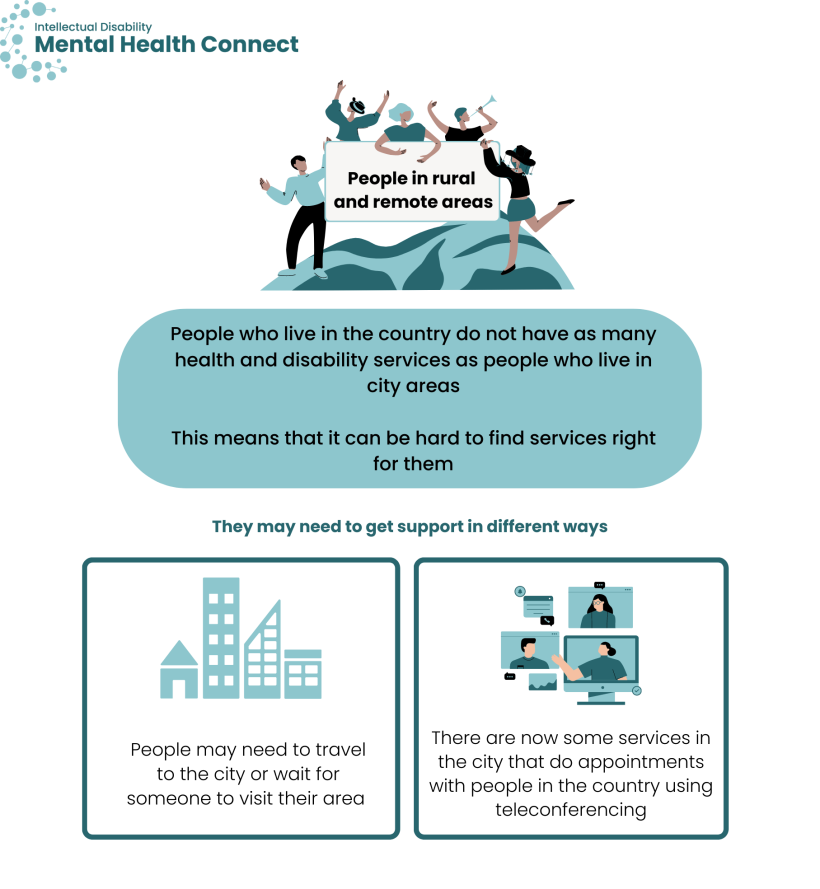People living in rural and remote areas
Jump to a section below
Introduction
People who live in the country do not have as many health and disability services as people who live in city areas. To learn more about services that can support your mental health visit Services for mental health.
This means that it can be hard to find services that know how to support people with intellectual disability who have a mental health problem. To learn more about what a mental health problem is visit About mental health and intellectual disability.
People may need to travel to the city or wait for someone to visit their area to get the support that they need.
There are now some services in the city that do appointments with people in the country using teleconferencing. Teleconferencing means that you can have your appointment on your phone or computer using a program such as Zoom. You may also hear people call this telehealth.

Concerns you may have when getting help for your mental health and what you can do
There are no mental health services in your area
It can be hard to find a mental health service in your area, especially one that knows how to work with people with intellectual disability. You may have to wait a long time or travel to the city to see a health worker.
Specialist Intellectual Disability Health Teams can do appointments with people in the country. They can have an appointment with you using teleconferencing. They may also be able to come to your area to see you.
Visit the Services page for a list of the Specialist Intellectual Disability Health Teams. Your doctor may need to contact the Team that can provide services to you.
Services send you away
Some mental health workers may send you away because they do not know how to work with people with intellectual disability.
It can make you worried or angry if a mental health worker sends you away but below are some things you can do.
- Ask them to give you the details of another mental health worker in your local area who can help you.
- Tell them they can contact someone who can give them advice if they do not know how to work with people with intellectual disability. Some people who they can contact include:
- Specialist Intellectual Disability Health Teams
- Statewide Intellectual Disability Mental Health Hubs.
- If you have to wait a long time for an appointment, ask them to give you or your support networks information about things that can help your mental health while you wait.
- Advocate for yourself or ask someone you trust to advocate for you. Advocate means to speak up for yourself or someone else. For information about how to advocate visit About advocacy.
You have to travel a long way to use services
You may be worried if you need to travel a long way to get help or go to appointments. There may not be public transport that can easily get you to the service. You may also need support from someone else to get to the service.
You can ask the service or mental health worker if you can have your appointment using teleconferencing. This means that you can have your appointment on the phone or computer without travelling to the service. You can ask someone you trust to support you to have your appointment.
If you do not have a phone or computer, you may be able to get one from the National Disability Insurance Scheme (NDIS). You can ask your NDIS Support Coordinator to help you apply for one.
If you cannot have your appointment using teleconferencing, you can:
- ask if the mental health worker can visit you at your home. This is known as a home visit
- ask your carers or support workers to help you arrange transport or a plan for how to get to the service
- ask your support worker or coordinator about how you can use your NDIS funding to help you get to appointments, if you have an NDIS plan.
Services and supports
- Specialist Intellectual Disability Health Teams have mental health workers who know how to work with people with intellectual disability. They can have appointments with you using teleconferencing or they may come to your local area. Visit the Services page for more information.
- Statewide Intellectual Disability Mental Health Hubs can give advice to your doctor or mental health worker. There is a Hub for children and a Hub for adults.